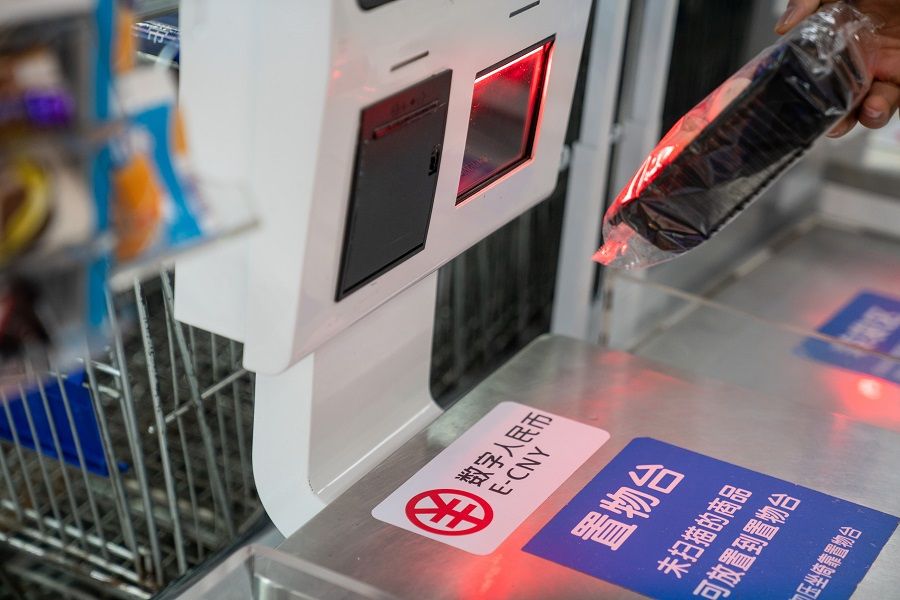Token economics: How Singapore can boost synergy with China in building digital economies
Academics Pei Sai Fan, David Lee and Yan Li say that an understanding of other countries' technological culture and policies is crucial in advancing digital economic cooperation. For instance, in the main, Singapore and China are able to mutually respect the differences in their blockchain and token policies, and focus on the complementarity of their approaches. Together, they can deepen their collaboration on central bank digital currencies and other projects, and lead the way regionally and globally in building digital economies of the future.

The world has been ravaged by the Covid-19 pandemic this year. At the G20 virtual summit attended by major countries and international organisations, world leaders said that we have entered a long-term post-pandemic period of living with the coronavirus, and must be prepared to fight a protracted war.
During the course of the pandemic, we noticed that countries with well-developed digital economies and disciplined citizens fared better in their coronavirus containment efforts and were less affected by the impacts of the pandemic. Take the Singapore and Chinese governments for example. On the one hand, both actively worked to fight the pandemic; on the other hand, both tried to make sure that the economy would continue to run smoothly and that national strategies and major innovation programmes would not be too greatly affected. Developing the digital economy was undoubtedly a priority of both governments, especially in terms of cutting-edge technologies such as blockchain and fintech.

We also noticed that various countries have recently taken some measures to mitigate or avoid a monopolised or "winner-takes-all" industry structure in traditional centralised digital economies. For example, the Chinese State Administration for Market Regulation recently released the "Guidelines for Anti-Monopoly in the Field of Platform Economy (Draft for Solicitation of Comments)".
Beginnings of a token economy
At the same time, we also found that both Singapore and China are pushing for the infrastructure development of a decentralised token economy. Security tokens, or asset-backed tokens, are digital representations with cryptography of ownership or rights relating to real assets in the physical world. Such tokenisation of real assets can create a more inclusive, easily accessible, and efficient token economy.
Some may ask, based on past reports, it is illegal to trade various forms of tokens, including cryptocurrency, in China. So why the need to build the infrastructure required for a token economy? Industry experts in Singapore believe that a blockchain without tokens is not a real blockchain. While this thinking seems to show a difference of opinion with China, it is actually quite the opposite - it shows that Singapore can interpret the nuances of China's national, cultural and technological policies, and use its edge in the digital capabilities to create opportunities for the city-state.

Firstly, tokens are an important incentive mechanism for public blockchains. Recently, there has been widespread speculation in the global token market. The recent rapid soaring of the market price of Bitcoin is a classic example. The Monetary Authority of Singapore (MAS) recently established new laws and made amendments to old ones that have largely covered all virtual assets and digital tokens, effectively regulating and preventing excessive speculation.
Singapore possesses a clear edge in the field of public and consortium blockchain. This is why Singapore and China are able to mutually respect the differences in their blockchain and token policies, and focus on the complementarity of their approaches.
China strictly prohibits token issuing and trading to prevent excessive speculation in this field, as well as avoid the recurrence of excessive speculation similar to the one in P2P lending platforms which resulted in huge financial losses for the general public and damages to society.
A "one-size-fits-all" policy may seem inflexible, but it is admittedly impactful, prompt, and effective. But would it kill innovation? Can this be understood as China only looking to develop private (enterprise) blockchains that do not need incentive mechanisms? Absolutely not. This is because we see China in the midst of forming a global public chain or an alliance chain network to build a Blockchain-based Service Network (BSN) and create a global second-generation smart internet of value network.
Complementarity between Singapore and China
Singapore possesses a clear edge in the field of public and consortium blockchain. This is why Singapore and China are able to mutually respect the differences in their blockchain and token policies, and focus on the complementarity of their approaches. Looking at the exploratory central bank digital currencies (CBDCs) projects of both countries, Singapore's Project Ubin focuses on wholesale application such as interbank settlement and clearing, while China's Digital Currency Electronic Payment (DC/EP) project focuses on retail businesses and meeting commercial and public digital payment needs. These digital retail payments could even be done offline.
Here, we see many complementarities again. In June this year, MAS Managing Director Ravi Menon spoke at Lujiazui Forum 2020 in Shanghai, mentioning that Singapore and China can deepen their collaboration on CBDCs. China's digital RMB can also expand into overseas markets. In that regard, former Governor of the People's Bank of China Zhou Xiaochuan recently proposed that Singapore and China can start from the retail industry when cooperating on CBDCs before considering replicating the successful cooperative model to ASEAN countries and even East Asia.

With complementarity, there would certainly be consistency. Blockchain serves the people because its embedded balancing mechanism can be used to create a fairer world. This is another point that Singapore and China strongly agree on.
... in major innovation fields, strategic and competitive advantages do not only come from commercial competitiveness in terms of cost and technology alone. An in-depth understanding of the industry's technology culture and government policies is also crucial.
Apart from network and system infrastructure, the building of a legal infrastructure is also crucial to the development of the digital economy. In the recently signed Regional Comprehensive Economic Partnership (RCEP), after a joint push by Singapore and China, the legal validity of electronic signatures has been confirmed by the agreement. Digital data storage is also advantageous to distributed ledgers in which a synchronised database is shared by multiple entities across various geographies, and will greatly accelerate the efforts of Singapore and China in the development of an ASEAN digital economy.
Thus, it can be seen that in major innovation fields, strategic and competitive advantages do not only come from commercial competitiveness in terms of cost and technology alone. An in-depth understanding of the industry's technology culture and government policies is also crucial. Based on the aforementioned examples, we see that Singapore's competitive edge not only comes from its comprehensive, robust, and innovative regulatory framework, but also from an effective and in-depth interpretation of the technological developments and policy contexts of various countries.
Singapore's edge in understanding technology culture and policies
This ability to understand the meaning of "harmony in diversity" is a competitive advantage in itself. If Singapore merely took policies at face value to learn about China's understanding of a token infrastructure, it could have lost major business opportunities brought about by China's well orchestrated "outside-in" deployment of a public blockchain service network. It could even result in unnecessary worry and competition in the digital currency field.
Entrepreneurs must put in more effort to understand Chinese technical language and fintech culture.

Most new technology entrepreneurs in Singapore have clear advantages in technical expertise. The government has also provided much support and funding to these enterprises through various programmes. Through interactions, however, we think that Singaporean entrepreneurs should further improve their interpretations of technology culture and government policies to gain an accurate grasp of the true meaning behind the policies of other countries. Entrepreneurs must put in more effort to understand Chinese technical language and fintech culture.
Asia is set to become the centre of global digital economy development in the post-pandemic era. To fully utilise business opportunities in Asia, our universities' technology and business education systems should stress on cultivating an understanding of the national conditions, language, and culture of various Asian countries. We should be particularly adept at understanding the humanities and geographical environments as well as the technologies and cultures of China, Indonesia, Myanmar, and Vietnam.
Only then can businesses be better prepared to enter the strategic blue ocean, obtain the first-mover advantage, and bring to bear our combined advantages in technology and business models.
Related: Will China's digital currency accelerate the internationalisation of the RMB? | RCEP affirms ASEAN's irreplaceable East Asian centrality | Former Chinese Vice-Minister He Yafei: Singapore and ASEAN have important roles to play in a multipolar world | China's whole-of-nation push for technological innovation







![[Photos] Fact versus fiction: The portrayal of WWII anti-Japanese martyrs in Taiwan](https://cassette.sphdigital.com.sg/image/thinkchina/3494f8bd481870f7c65b881fd21a3fd733f573f23232376e39c532a2c7593cbc)